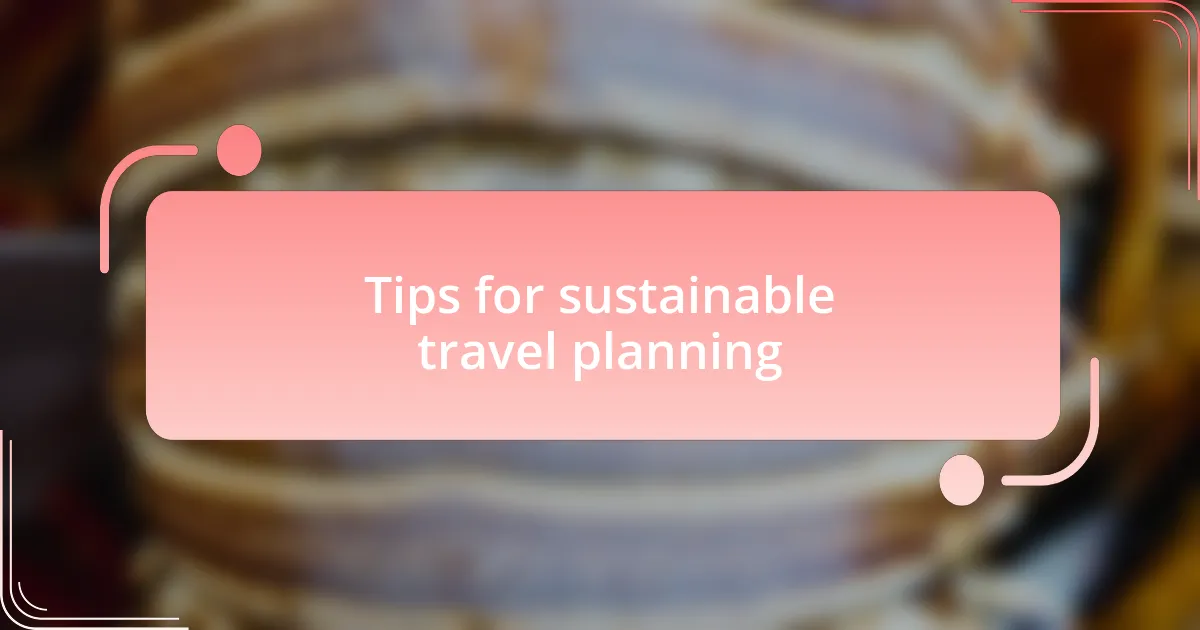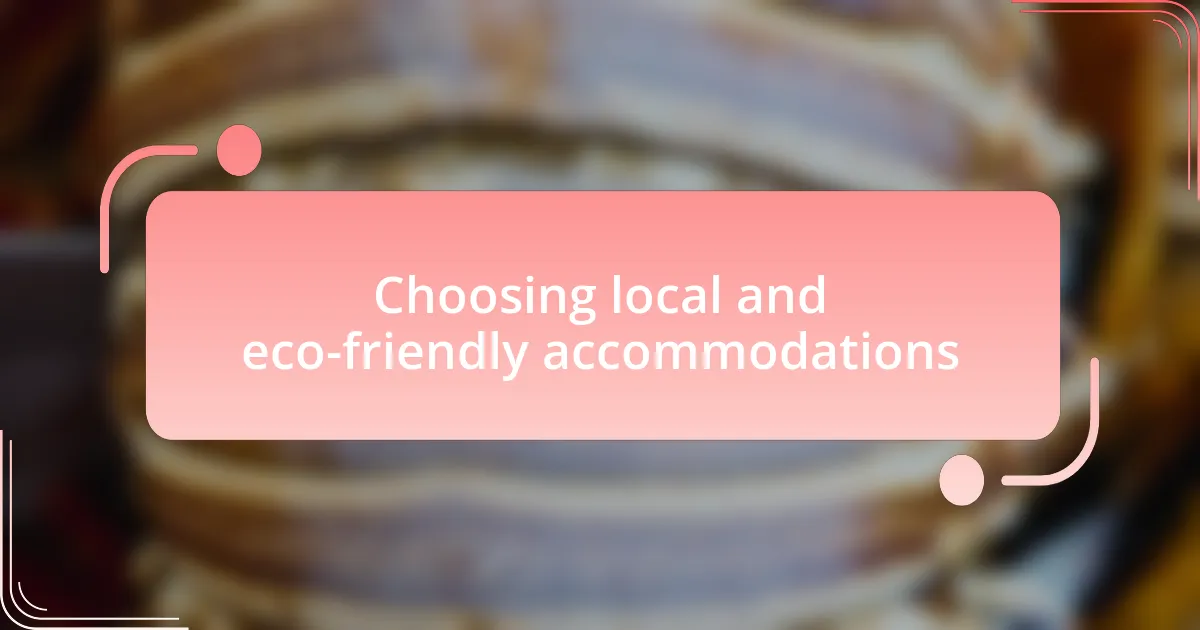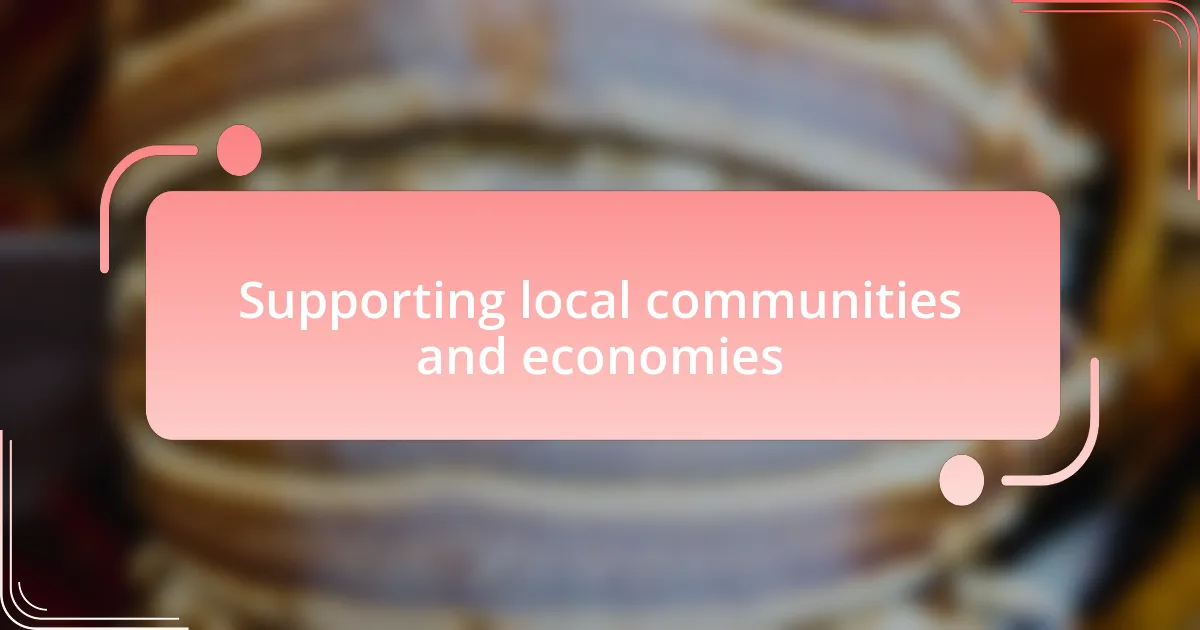Key takeaways:
- Sustainable travel involves making choices that support local communities, preserve culture, and minimize environmental impact.
- Ethical marketplaces empower local artisans and promote fair trade, emphasizing the importance of transparency and informed consumerism.
- Choosing eco-friendly accommodations and supporting local businesses enhances travel experiences and contributes positively to the community.
- Engaging with local guides deepens travelers’ understanding of cultural and environmental contexts, fostering authentic connections.

Understanding sustainable travel choices
Sustainable travel choices are about more than just eco-friendly practices; they involve a mindset shift that prioritizes the health of the planet and the well-being of local communities. I remember my trip to a small village in Costa Rica, where I stayed with a family committed to sustainable agriculture. Witnessing their efforts made me realize that every choice we make as travelers has the potential to support or undermine those communities.
When I think about sustainable travel, I often ask myself, “How can I leave a positive impact where I go?” Simple decisions, like choosing local guides or dining at farm-to-table restaurants, can significantly contribute to the local economy and promote cultural preservation. On a recent adventure, I opted for a guided hike with a local naturalist who shared the region’s environmental challenges, and it deepened my connection to the destination in ways I hadn’t anticipated.
Understanding sustainable travel choices also requires recognizing the broader implications of our adventures. It’s essential to consider carbon footprints, waste management, and resource conservation. I found myself reflecting on this after witnessing the overwhelming plastic waste at a beautiful beach; it sparked a fire in me to advocate for cleaner travel practices. So, how will you ensure your travels contribute positively rather than detract from the places you visit?

Importance of ethical marketplaces
The significance of ethical marketplaces cannot be overstated, especially in the context of sustainable travel. I recall visiting a local craft fair in Bali, where artisans shared not just their work but their stories. Supporting these markets means choosing products that reflect cultural authenticity and promote fair wages for local workers. Isn’t it empowering to know that your purchases can directly uplift communities?
Ethical marketplaces also play a crucial role in environmental conservation. When I discovered a store selling goods made from recycled materials in a small town, I felt an immediate connection to the entire cycle of sustainability. Each product was a testament to creativity and responsibility, reminding me of my impact as a consumer. Have you considered how your spending habits can support not just local economies, but also the planet?
Moreover, ethical marketplaces create networks that prioritize transparency and integrity. I experienced this firsthand when I met a farmer who shared the journey of his products from field to table. His transparency fostered trust and connection, assuring me that my choices were informed and impactful. How often do we consider the story behind what we buy? Engaging with ethical marketplaces invites us to be part of a larger narrative that values people and the environment.

Ways to identify ethical brands
When searching for ethical brands, I often look for certifications that indicate a commitment to sustainability and fairness. For instance, labels like Fair Trade, B Corp, or Rainforest Alliance signify that a brand meets rigorous social and environmental standards. Discovering a brand with these certifications can feel like finding a trustworthy companion for your sustainable journey.
Another method I use is to evaluate a brand’s supply chain transparency. It’s fascinating how some companies openly share sourcing practices and provide insight into the working conditions of their workers. I remember coming across a clothing brand that detailed not only where their materials came from but also how they support their workers with fair wages and safe working environments. This kind of clarity made me feel confident in supporting them – wouldn’t you want to know the full story behind your purchases too?
Lastly, I pay attention to customer reviews and the brand’s own storytelling. Social media has made it easier to uncover both positive and negative feedback. I once stumbled upon a small coffee company that highlighted their partnerships with local farmers. Reading through the reviews, I was moved by how customers connected emotionally with the brand’s mission, echoing my belief that brands should inspire a shared sense of purpose. How often do we find ourselves drawn to brands that engage us on a deeper level?

Tips for sustainable travel planning
When planning a sustainable trip, I find that opting for eco-friendly accommodations is essential. I remember booking a stay at a charming eco-lodge where everything was designed with the environment in mind—from solar panels to recycling initiatives. Those efforts made my experience feel not just comfortable, but also responsible; have you ever stayed somewhere that truly felt like a part of the natural world?
Another crucial tip is to consider your mode of transportation. I often weigh the carbon footprint of my travel choices, and I’ve discovered that taking a train can be a more sustainable option compared to flying. On one journey, I chose the train and was surprised by the stunning views I experienced along the way, making the travel itself a memorable part of my adventure. Isn’t it refreshing when our travel choices not only benefit the planet but also enrich our experience?
Lastly, I aim to support local businesses during my travels, whether it’s dining at family-owned restaurants or purchasing handcrafted souvenirs. During a visit to a small coastal town, I decided to skip the big chains and instead tried the local seafood market. The freshness was unmatched, and the joy of supporting the community was a feel-good bonus. Have you ever thought about how your spending can uplift a local economy while creating unique memories?

Choosing local and eco-friendly accommodations
Choosing local and eco-friendly accommodations can significantly enhance your travel experience while minimizing your environmental impact. I once booked a quaint bed-and-breakfast run by a local couple who utilized organic farming practices. Every morning, I enjoyed freshly picked fruits for breakfast, and I felt a real connection to the land which deepened my appreciation for the destination. Have you ever stayed somewhere that felt authentically tied to the community, rather than just a stopover?
It’s worthwhile to investigate the sustainability practices of the places you’re considering. For instance, I discovered a hostel that not only prioritized energy efficiency but also sourced all its products from nearby vendors, reducing transportation emissions. Being surrounded by other eco-conscious travelers created a lively and inspiring atmosphere—one that motivated me to consider my own lifestyle choices. How rewarding is it to share a space with fellow travelers who value responsible living?
Additionally, while it may be tempting to prioritize luxury or price, I find that opting for eco-friendly options often leads to unexpected adventures. Last summer, I stayed at a tiny eco-cabin nestled in the forest, where I was invited to participate in a community reforestation project. The experience was not just a stay but a chance to contribute positively to the environment, making my travels feel impactful. What stories could you bring home if you chose accommodations that resonate with your values?

Supporting local communities and economies
Supporting local communities can transform your travel experience significantly. During my last trip to a small coastal village, I decided to eat at family-owned restaurants instead of larger chains. The homemade dishes not only delighted my taste buds but also sparked conversations with the owners about their lives and traditions. Have you ever felt that connection when sharing a meal with locals?
Investing in locally made crafts and goods is another wonderful way to uplift the economy. I remember visiting a market filled with artisans showcasing their handmade products. By purchasing a beautifully crafted piece of pottery, I felt good knowing my money was directly supporting an artist’s livelihood. Isn’t it satisfying to know that your purchase has a ripple effect in the community, creating jobs and preserving cultural heritage?
Engaging with local tour guides also fosters a deeper understanding of the region. On one adventure, I joined a walking tour led by a local resident who shared insights about their culture and history that I wouldn’t have found in any guidebook. This immersion into their stories enriched my journey and made me appreciate the place on a much deeper level. How often do we miss out on these connections by sticking to the usual tourist paths?